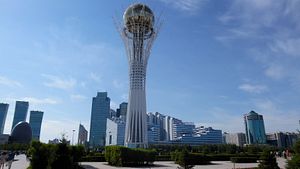For those whose impressions of Kazakhstan’s domestic religious situation come solely from public relations whitewash, the country might appear a multiconfessional bastion in a region rocked by fundamentalism. Indeed, playing up the country’s apparent pursuit of religious freedom is one of the key aspects of Astana’s international spin; hence, why the country hosts the World Religious Congress, a multifaith grouping nominally dedicated to “constructive interreligious dialogue.”
However, any claims toward putative freedoms of religion in Kazakhstan have clearly crumbled over the past few years. Like political or press freedoms before it, religious freedom in Kazakhstan has only constricted over the prior decade. Following notorious 2011 legislation that shuttered some two-thirds of “nontraditional” religious groups in the country, Kazakhstan has only continued closing the noose around remaining “nontraditional” religions — especially those of the Christian variety.
The latest move against domestic Christian denominations, first flagged by Newsweek, came just last week, with the country’s Jehovah’s Witnesses watching operations at their Almaty headquarters suspended. The closure, which follows on the heels of Russia’s effective banning of any and all Jehovah’s Witness worship on its territory, “came less than two months after a 61-year-old believer was sentenced to five years in prison on a charge of inciting religious hatred,” Newsweek reported. As Bekzat Smagulov told the publication, “How will we think because if what happened in Russia and then we have these problems? How do you explain these things?” One of the Jehovah’s Witnesses reportedly arrested may not be “receiving proper medical care for his cancer,” according to rights activists.
Kazakhstan’s move against its Jehovah’s Witnesses is of a piece with recent raids against fellow Christian denominations. As the most recent assessment from the U.S. Commission on International Religious Freedom (USCIRF) on Kazakhstan illustrated, government officials recently turned their sights on Baptists and Pentecostals, the latter of which, like Jehovah’s Witnesses, originally began as an American strain of Christianity. Per USCIRF, Kazakh police “reportedly fined without trial at least three Council of Churches Baptists,” although one fine was later annulled. Police also raided a pair of Baptist summer camps last year, with a Pentecostal church in Aktau likewise “a frequent target of official harassment.” While Ahmadi and Hare Krishna texts have also been banned in the country, administrative fines — the most frequent kind of punishment deployed against religious groups in Kazakhstan — “are often levied against Christians.”
This burgeoning persecution of domestic Christian denominations has played no small role in the USCIRF’s decision to list Kazakhstan as one of the 28 worst countries internationally for religious freedoms. As a Tier 2 country since 2013, Kazakhstan joins the likes of North Korea, Cuba, Saudi Arabia, Afghanistan, and Russia among the worst violators globally. As a recent statement from Human Rights Watch’s Hugh Williamson read, “Kazakhstan’s domestic rights record is still a far cry from the international standard.”
That, of course, is little consolation to Kazakh Jehovah’s Witnesses suddenly wondering about their future. But it’s certainly one more marker blotting Kazakhstan’s claims to religious freedom, no matter how many World Religious Congresses may come. After all, as a recent interfaith expert told Foreign Policy, the most recent World Religious Congress was “a complete waste of time, developed along the old lines of the Soviet Religion and Peace events, which were likewise a front for repressive regimes trying to look nice.”
































